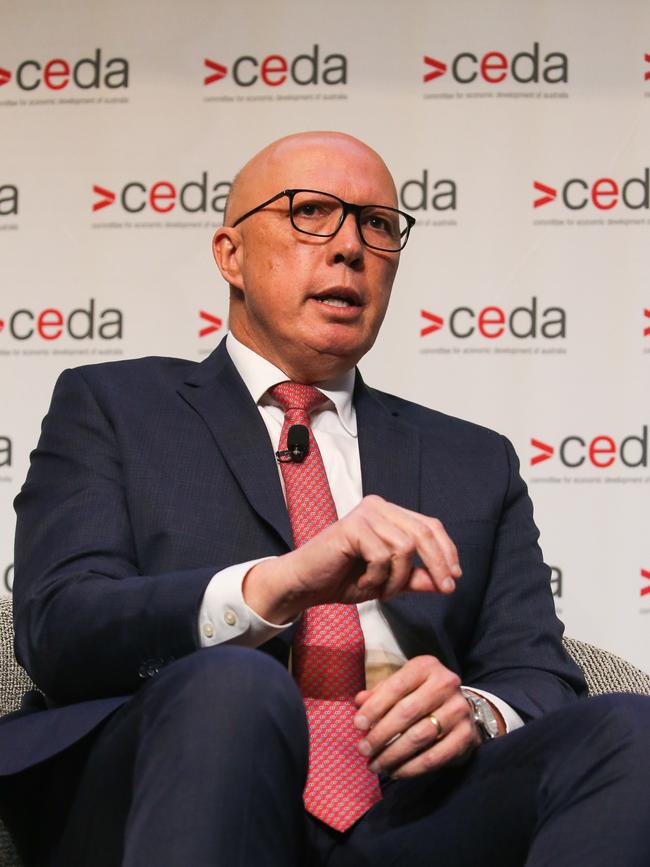
The days when the BCA was an august and powerful lobby are over because the organisation can never be more than its members.
There are four reasons the BCA has become a pinata for mainstream Australians.
First, if the BCA and its members continue to embrace left-wing populist causes, consistently proving themselves to be out of touch with millions of Australians, they should expect an equal and opposite reaction from the community. When the BCA and its members shove their chosen causes down our throats, as if we are unthinking muppets, respect for them tanks.
The most recent example is the BCA’s wholesale, gullible adoption of the voice and the bullying way many of its members foisted the controversial proposal to alter the federal Constitution on their employees and other businesses.
Having learned nothing from that recent debacle, our biggest Australian companies still take positions on matters that are increasingly discredited as overtly political rather than commercially driven. They continue to pursue ideological diversity, equity and inclusion agendas that rapidly are being abandoned in the US as divisive and unproductive social engineering. Likewise, corporate Australia continues to take a more radical approach in support of Indigenous separatism than large swathes of mainstream Australia. KPMG’s Acknowledgment of Country, for example, is drenched in politics far more radical than would likely be supported bymost Australians.

By claiming to be the great moralisers of modern Australia, possessing virtue and wisdom way ahead of the average Australian, the BCA and its members are virtually begging to be knocked down a peg or two.
The second reason the BCA and its members have lost credibility is down to its own internal conflicts within its expanded membership base. The lobby group was most powerful when it had clear and forceful leadership under business legends such as Hugh Morgan, and a united membership. However, as time went on and the BCA expanded its membership to include big professional service firms - think law, accounting and consulting firms - conflicts developed.
As the BCA sought more members, and membership fees, those internal conflicts undermined the BCA’s unity of focus and single-mindedness – and therefore its clout.
The BCA today counts as its members big legal, accounting and professional services firms
that make more money as regulation grows more complex and intrusive. Conversely, those same regulations hit the bottom line of corporate members of the BCA. Legal and accounting firm representatives of the BCA make a motza from every new environmental, social and governance regulation. The introduction of new and onerous carbon disclosure requirements into accounting standards will be a veritable gusher of professional fees.
The conflicts within the BCA are plain as day. Big service providers such as KPMG thrive from over-regulation; Australian companies suffer from over-regulation. This internal conflict between members has drastically weakened the BCA’s ability to prosecute reforms that drive the productive engines of Australian business.
By contrast, industry groups with shared objectives and no internal conflicts are vastly more effective than diffuse groups with conflicting objectives. Though the Minerals Council of Australia has suffered internal differences in the past, it is now a more unified and coherent force whose chief executive, Tania Constable, has shown strikingly strong and charismatic leadership.
Of course, these big professional service members of the BCA are too smart to position their stance as a sordid matter of money. Rather, the BCA and its industrial members are told it’s a matter of morality, that only a philistine or a degenerate could object to new ESG regulations, or to DEI mandates or to industrial laws that improve workers’ rights.

Even if the BCA did have members on par with the thundering business leaders of the past – David Murray and Don Argus types – they would be dismissed as troglodytes and told to go into self-exile in the naughty corner. The net result: industrial company members of the BCA have succumbed to the regulatory equivalent of Stockholm syndrome.
The takeover of the BCA by politically progressive professional service providers is nowhere better evidenced than by the presence of prominent lawyer and voice advocate Danny Gilbert and former KPMG stalwart Alison Kitchen on the BCA board. No doubt, both are extremely capable and well-intentioned, but it’s a mystery why such prominence should be given to people with backgrounds in industries that profit from regulation on a body whose other members suffer hugely from over-regulation.
The third reason the BCA is a beige shadow of its former self shouldn’t come as a surprise either. Not only has it been comprehensively infiltrated by service providers, consultants and those who profit handsomely from over-regulation, but even the powerhouse industrial companies that once drove a clear-eyed focus on economic rationality have themselves been white-anted by union-controlled industry super funds.
At any vote on a remuneration report or for directors, industry super funds call the tune. The industry funds are not only big shareholders, they are also ideological, like-minded pack animals. Most important, they are not afraid to use their power to ensure ASX-listed corporates toe the line.
Unsurprisingly, then, boards of ASX-listed companies are now full of people industry super funds would regard favourably – ideologically sound box tickers and lovers of regulation. It’s hard to imagine a Leigh Clifford or a Chris Corrigan being appointed as a non-executive director of a listed company today. If our biggest company boards have been reduced to milksop status, it is any wonder the BCA is regarded with derision as a milquetoast?
The fourth reason the BCA is ensnared in a sticky web of over-regulatory wokeness similarly stems from another weakness of its members. Recent developments governing the composition of the boards of BCA members have driven conformance and box ticking, not performance. Being a non-executive director has become a booming stand-alone career for many mid-level former executives, professionals and consultants.

In the past, boards had a decent number of wise old hard heads who often were former C-suite executives at the end of their business career. Sure, there was a boys club. But hold your horses before crowing about the new emerging girls club. Getting more women on boards has meant that NEDs are now often younger and more likely to have consulting or professional backgrounds than C-suite credentials. Increasingly NEDS are expected to tick other diversity boxes as well.
This has led to the growth of an entirely new class of professional directors. Many do a directors course with the Australian Institute of Directors, network with like-minded NEDS and, hey presto, start a NED career. Many come to boards in their 40s after a professional or consulting career, or a mid-level corporate career.
Though advocates – and members of this new NED class – say the new “diversity” is great for business, there is a dearth of hard evidence to support that claim. Plenty of feel-good dogma and correlation talk, but we await rigorous testing from genuinely independent sources rather than from the usual suspect professional service providers that are hopelessly conflicted. The irony is that the new “diversity” push has led to a new homogenous group of like-minded NEDs from similar backgrounds who are much more likely to be lovers of regulation than was once true.
Moreover, having abandoned financial support for their traditional political allies – the Coalition – in favour of neutrality, the BCA and its members now find themselves utterly friendless. So far Peter Dutton seems to be prepared to be the mining industry’s “best friend” because it’s both good policy and good politics. But many in the Coalition are asking why they should spend a single political brownie point on a constituency that doesn’t support them and that looks down on their mainstream supporters.







The Business Council of Australia is correct to say that populist business bashing must stop. But in large part the BCA and its members have only themselves to blame for their low standing.